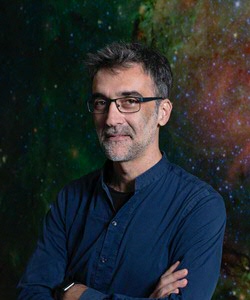ERC Advanced Grant for Filippo Fraternali
The European Research Council has awarded an ERC Advanced Grant to Prof. Filippo Fraternali of the Kapteyn Astronomical Institute of the Faculty of Science and Engineering. Prof. Fraternali can use the grant to precisely determine the properties of gas flows in and out of galaxies.
The European Research Council (ERC) awards grants to excellent researchers to stimulate groundbreaking research in Europe. The Advanced Grants are meant for established academics with a track-record of significant research achievements. Advanced Grants may be awarded up to €2,5 million for a period of 5 years.

Filippo Fraternali studies galaxy formation and evolution from the early Universe to present-day galaxies, including the Milky Way. His particular focus is on the role of gas, which constitutes the vast majority of the ordinary matter in the Universe.
Galaxies grow and fuel their star formation through the acquisition of new gas from the intergalactic medium. At the same time, the explosion of stars as supernovae ejects copious amount of gas from galaxies into the environment. Fraternali studies these gas flows through analysis of observations, theoretical models and hydrodynamical simulations. However, the physics of and the interplay between the gas flows are very complex with the consequence that our current understanding of them is rather incomplete.
In his ERC project, Fraternali aims to precisely determine the properties of gas flows in and out of galaxies across cosmic time and explain their role in galaxy formation and evolution. To achieve this goal, he will use a combination of innovative data analysis and theoretical investigations. Data from state-of-the-art astronomical facilities like ALMA and the JWST will be used together and in synergy with newly designed theoretical models. The final goal will be to significantly improve our current models of galaxy formation.
More news
-
15 September 2025
Successful visit to the UG by Rector of Institut Teknologi Bandung
